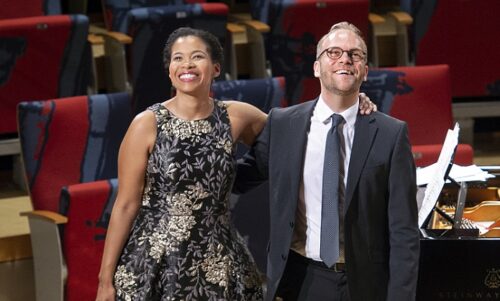
 United Kingdom Edinburgh International Festival 2022 [6] – This Be Her Verse: Golda Schultz (soprano), Jonathan Ware (piano). Queen’s Hall, 17.8.2022. (SRT)
United Kingdom Edinburgh International Festival 2022 [6] – This Be Her Verse: Golda Schultz (soprano), Jonathan Ware (piano). Queen’s Hall, 17.8.2022. (SRT)

Clara Schumann – Liebst du um Schönheit; Warum willst du andre fragen; Am Strande; Lorelei
Emilie Mayer – Wenn der Adendstern die Rosen; Du bist wie eine Blume; Erlkönig II
Rebecca Clarke – Down by the Salley Gardens; The Tiger; Cradle Song; The Seal Man
Nadia Boulanger – Cantique; Prière; Elégie; La mer
Kathleen Tagg & Lila Palmer – This Be Her Verse
There are lots of programmes these days that devote themselves to rediscovering the work of female composers – there is a lot of lost time to make up for, after all! – but this is one of the most sensitively designed approached to that theme that I have come across recently.
Golda Schultz and Jonathan Ware entitled their recital This Be Her Verse, taking the name from the eponymous song cycle that they commissioned and that ends the programme. Before that, they performed songs by female composers, some well-known and some not, that are designed to show just how much we are missing out on if we consign female composers to a forgotten area of musical history.
Clara Schumann is an increasingly well-known composer these days, no longer in the shadow of her husband, if she ever was. Schultz and Ware’s choice of songs show just what an accomplished songsmith she was. Her melodies are lovely but, in dramatic songs like Am Strande or Lorelei, it is the darkly descriptive piano lines that draw the attention.

That served as a forceful reminder of Jonathan Ware’s role in this recital. This was very much a partnership of equals, with Schultz never stealing the limelight. Repeatedly Ware’s piano part matched Schultz’s vocal line and provided essential dramatic accompaniment, particularly in the songs by Rebecca Clarke. The roiling, threatening piano line in The Tiger, a setting of Blake, added to the sense of the beast’s terrifying strangeness, something furthered by the fragmented, almost expressionistic vocal line. Clarke’s setting of John Masefield’s The Seal Man had operatic levels of intensity, with narrative power deftly handled by the descriptive vocal line and the stormy piano.
Emilie Mayer’s music was all but forgotten after her death in 1883, but there are wonderful things in songs like Wenn der Abendstern die Rosen with its beauteous sense of simple pleasure, and the sympathetic sense of love and loss is gorgeous in Du bist wie eine Blume. Her setting of Goethe’s Erlkönig is fascinating when set alongside Schubert’s, achieving a very different sort of drama by making the Erlking more dangerously alluring. The dark drama of Nadia Boulanger’s songs show that she is in no way overshadowed by the talents of her sister.
And the culminating This Be Her Verse was very convincing, too. Lila Palmer’s poetry seeks to subvert many traditional male expectations of women’s roles in life, and Kathleen Tagg’s music serves it with a combination of melody and irony. Ware had to play a prepared piano, often strumming the strings directly, or playing keys that mimicked bells or a double bass. This variety of sound was quite a feat to achieve, and Schultz acted as much as she sang in the three songs. The music is fun as well as engaging, a mixture of old-fashioned melody alongside jazz influences and bluesy introspection.
It is almost an afterthought to say that Schultz has a wonderful voice for this repertoire, scaled back in size and well-tailored to the intimacy of the Queen’s Hall. It’s clean and effortless at the top, with a sense of easy beauty to it, very expressive in both tone and word-meaning. It was combined with utter conviction here, a determination that it is time for women’s voices to be heard and, when they sound this good, it is hard to disagree.
Simon Thompson
The concert was broadcast live on BBC Radio 3 and is available to listen again on BBC Sounds until 15th September 2022. The Edinburgh International Festival runs until Sunday 28th August at a variety of venues across the city. Click here for details.
